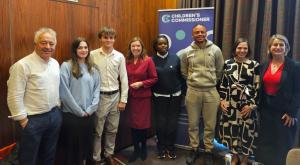Last month at the Labour Party Conference in Liverpool I co-hosted a panel discussion with my Youth Ambassadors, Emma, Stanley and Valerie.
We were joined by a great panel of advocates for children: Frank Cottrell-Boyce, the Children’s Laureate, housing campaigner Kwajo Tweneboa, and Members of Parliament Sarah Smith, the National Opportunity Mission Champion and Helen Hayes, chair of the Education Select Committee. Together with the three Youth Ambassadors, discussion covered the need to include children’s voices in education reforms and what more needs to be done to ensure all schools can better support children’s additional needs.
I asked my three Ambassadors to reflect on the experience – and on why it is so important for young voices to be heard at events where decision makers are listening.
Stanley: “Speaking at the Labour Party Conference was an exciting opportunity, particularly as I was able to speak about something I’m so passionate about: young carers. The feeling of being listened to as well, and knowing the other Ambassadors were making their voices heard, was extremely rewarding. Hearing the other people on the panel tackle the issue from their perspective was interesting too, for example Frank Cottrell-Boyce pointed to a decline in reading and a rise in social media addiction – an argument I found compelling.”
Emma: “It was great to join Dame Rachel for The Big Conversation panel event in Liverpool – it was such an amazing event. It was so inspiring to be on the panel and talk about my experiences with influential people who are striving to make a real difference for children and young people every day.”
Valerie: “I really enjoyed the day, especially as it was my first time going to Liverpool! I really appreciated the chance to join the other Ambassadors on the panel as I was able to talk about issues that matter to children and young people, such as greater support for young carers and the importance of policymakers, local authorities and schools ensuring that they engage with all children, and in particular children from marginalised or disadvantaged groups.”





